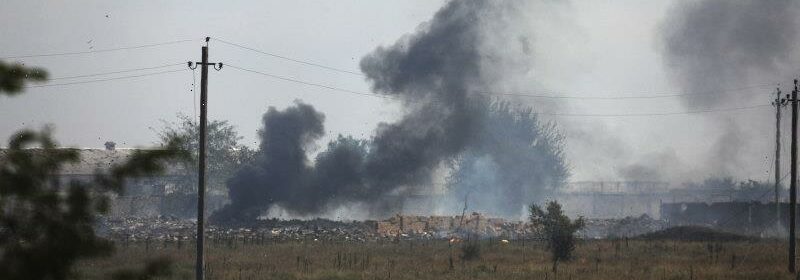Blasts at Russian base in Crimea suggest Ukrainian fightback

Kyiv: Moscow denounced sabotage and Ukraine hinted at responsibility for new explosions at a military base in Russian-annexed Crimea that is an important supply line for Russia’s invasion of Ukraine.
The blasts on Tuesday (Ukraine time) engulfed an ammunition depot at a military base in the north of the Crimean peninsula, disrupting trains and forcing the evacuation of 2000 people from a nearby village, according to Russian officials and news agencies.
Smoke rises over the site of explosion at an ammunition storage of Russian army near the village of Mayskoye, Crimea.Credit:AP
Plumes of smoke were later seen at a second Russian military base in central Crimea, Russia’s Kommersant newspaper said, while blasts hit another facility in the west last week.
The explosions raised the prospect of new dynamics in the six-month-old war if Ukraine now has capability to strike deeper into Russian territory or pro-Kyiv groups are having success with guerrilla-style attacks.
Russia has used Crimea, which it annexed from Ukraine in 2014, to reinforce its troops fighting in other parts of Ukraine with military hardware, a process Ukraine is keen to disrupt ahead of a potential counter-offensive in the south.
Crimea is the base of Russia’s Black Sea Fleet and also popular in the summer as a holiday resort.
In Tuesday’s blasts, an electricity substation also caught fire, according to footage on Russian state TV. Seven trains were delayed and rail traffic on part of the line in northern Crimea had been suspended, Russia’s RIA news agency said.
Operation ‘demilitarisation’
Ukraine has not officially confirmed or denied responsibility for explosions in Crimea, though its officials have openly cheered incidents in territory that, until last week, appeared safe in Moscow’s grip beyond range of attack.
Ukrainian presidential adviser Mykhailo Podolyak and chief of staff Andriy Yermak both exulted on social media at “demilitarisation”: an apparent mocking reference to the word Russia uses to justify its invasion.
People help evacuate an elderly man from an area near the site of explosion at the ammunition storage of the Russian army.Credit:AP
“Operation ‘demilitarisation’ in the precise style of the Armed Forces of Ukraine will continue until the complete de-occupation of Ukraine’s territories. Our soldiers are the best sponsors of a good mood,” Yermak wrote on Telegram.
Russia’s defence ministry said the explosions at the ammunition depot were “a result of sabotage”.
With the war raging since February 24, attention has also focused in recent days on shelling in the vicinity of the Zaporizhzhia nuclear reactor complex, Europe’s largest, in a Russian-occupied area of southeastern Ukraine.
Russian-installed officials there, quoted by Interfax news agency, said on Tuesday that Ukrainian forces shelled the city of Enerhodar where the plant is located. They accused Ukraine of doing so to provoke Russia into returning fire.
Later that day, 20 Russian rockets and 10 artillery rounds hit the city of Nikopol on the Ukrainian government-controlled bank of the Dnipro river across from Enerhodar, the Ukrainian regional governor Valentyn Reznichenko wrote on Telegram.
He said four people were wounded.
Reuters could not immediately verify either side’s accounts.
Each side has blamed the other for heightened risks to the Zaporizhzhia plant, which Russia seized in March though Ukrainian technicians continue to operate it.
Smoke rises over the site of explosion.Credit:AP
The technicians work under the gaze of heavily armed Russian troops and face huge pressure, but are staying on to make sure there is no Chornobyl-style disaster, one of them said, offering a rare glimpse into the unnerving working conditions there.
Armoured personnel carriers have their barrels pointed at the entrance as workers enter, the technician said, asking for anonymity for fear of Russian reprisal.
“It’s very hard when you go into the plant and see these people and have to be there. It’s very mentally and psychologically taxing,” he said.
Meanwhile, Russia’s FSB security service accused Ukrainian “saboteurs” of repeatedly blowing up electricity pylons running from a nuclear power station in the Kursk region, some 90 kilometres north of the Ukraine border, disrupting plant operations.
Reuters was not able to substantiate the report. Ukraine’s defence ministry did not immediately respond to a request for comment.
The Ukraine conflict has caused millions to flee, killed thousands and deepened a geopolitical rift between Moscow and the West.
Moscow calls its invasion a “special military operation” to demilitarise its neighbour and protect Russian-speaking communities. Ukraine, which was part of the Russian-dominated Soviet Union until its 1991 break-up, accuses Moscow of waging an imperial-style war of conquest.
Grain export progress
As the biggest attack on a European state since 1945 ground on, there was further progress on a UN-brokered deal for grain exports to resume. A Russian blockade of Ukrainian ports on the Black Sea had worsened a global food crisis.
Following the unblocking of ports, the ship Brave Commander carried the first cargo of food aid for Africa from Ukraine since Russia’s invasion.
And the first ship to depart Ukraine two weeks ago under the July 22 deal docked in the Syrian port city of Tartous on Tuesday, according to a shipping source and satellite data.
Ukraine can export 3 million tonnes of grain from its ports in September and may eventually be able to export 4 million tonnes monthly, a government official said.
UN Secretary General Antonio Guterres will visit Odesa, Ukraine’s main Black Sea port, on Friday while on a trip to the country during which he will have talks with President Volodymyr Zelensky and President Tayyip Erdogan of Turkey, which helped engineer the grain accord, a UN spokesman said.
Reuters
Get a note directly from our foreign correspondents on what’s making headlines around the world. Sign up for the weekly What in the World newsletter here.
Most Viewed in World
From our partners
Source: Read Full Article


